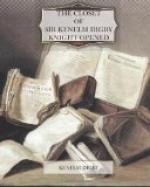p. xxxviii 1. 20 Lloyd’s Lives of Excellent
Personages that suffered
for ... Allegiance to
the Soveraigne in the late Intestine Wars,
ed. 1668.
p. xliv 1. 10 “remedy for Biting of a Mad Dog.”
There is a similar
receipt in Arcana Fairfaxiana,
ed. G. Waddell, 1890, a
collection of old medical
receipts, etc. of the Fairfax and
Cholmely families. “A
Cure for the Bite of a Mad Dog Published for
ye Benefit of Mankind in the
Newspapers of 1741 by a Person of
Note.... N.B. This
Medicine has stood a tryal of 50 years
Experience, and was never
known to fail.”
p. liii 1. 30 Culpeper’s English Physitian, 1653.
p. liii 1. 30 N. Culpeper. Herball.
p. liii 1. 30 John Gerard. The Historie of Plants, 1547.
p. liii 1. 31 Wm. Coles. Adam in Eden and The
Art of Simpling. 1657
and 1656.
To the Reader.
p. 3 1. 20 “that old Saw in the Regiment of
Health.” The Regyment, or
a Dyetary of Helth.
By Andrew Borde, 1542. (Reprinted by the Early
English Text Soc.)
Receipts.
p. 5, etc. “Metheglin is esteemed
to be a very wholsom Drink; and
doubtless it is so, since
all the world consents that Honey is a
precious Substance, being
the Choice & Collection which the Bees
make of the most pure, most
delectable, & most odoriferous Parts of
Plants, more particularly
of their Flowers & Fruits. Metheglin is
therefore esteemed to be an
excellent Pectoral, good against
Consumption, Phthisick and
Asthma; it is cleansing & diuretick,
good against the Stone & Gravel;
it is restorative and
strengthening; it comforts
and strengthens the Noble parts, &
affords good Nourishment,
being made Use of by the Healthy, as well
as by the Sick.
“My worthy Master, that Incomparable Sir Kenelm
Digby, being a great
lover of this Drink, was so
curious in his Researches, that he made
a large Collection of the
choicest & best Receipts thereof.”
Hartman, Select Receipts, p. 1.
Concerning the difference between Mead and Metheglin,
Borde (Regyment
of Helth) says:—
“Of Meade: Meade is made of honny
& water boyled both togyther; yf it
be fyred and pure, it preserveth
helth; but it is not good for them
the whiche have the Ilyache
or the Colycke.
“Of Metheglyn: Metheglyn is made
of honny and water, & herbes, boyled
and sodden togyther:
yf it be fyred and stale, it is better in the
regyment of helth than meade.”
But the distinction seems to have been forgotten in
the hundred odd
years between the publication
of Borde’s book and Digby’s.




